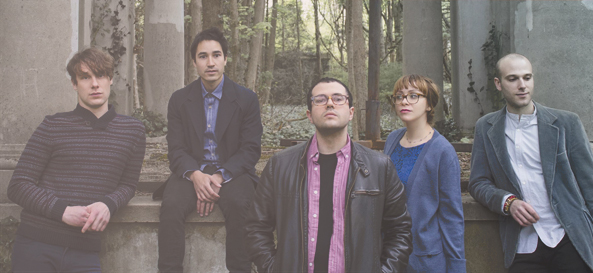
Indie rockers Freelance Whales formed in 2008 after connecting via Craigslist, and in the four years since have taken the festival world by storm. The group managed a great deal of their promotion themselves, busking in the streets and subways of New York and playing house parties, including a literary fraternity. Their first performance was to a “spirited” audience at an abandoned, and apparently haunted, farm colony on Staten Island. Here, vocalist and drummer Jake Hyman discusses that first performance, his roots in classical music and the making of their newest album, Diluvia.
You started playing together four years ago. By industry standards, you’ve become popular quite quickly. Did you ever see that coming?
I can honestly say that when we started playing together four years ago, the entire concept of playing anywhere outside of the small basement studio beneath a bakery in Queens was completely foreign to us. We had no illusions of festivals or international touring, or even playing in a bar in our own hometown in front of more than fifteen people, all of whom were usually friends. Neither had we even a notion that a “five-year plan” was something we might need, because the assurance of longevity and relative success in our industry is so rare.
Freelance Whales formed through responding to ads on Craigslist. Is that something you would recommend trying to other musicians?
Craigslist was an important tool for us to form the band, and if you’re having trouble meeting other like-minded musicians in your city it can certainly be useful. It also requires a lot of patience and determination to sift through the people who aren’t a good fit. By and large, I think we are a happy accident, but that does not at all mean it’s something that couldn’t happen again.
Diluvia is filled with unusual instrumentation. How does that come together?
When a song is calling for a certain sound, we make it our mission to go out and find something that can make that sound. Whether it’s our harmonium from India, or a zither from China, or even something as simple as a trumpet, when it becomes clear that a particular sound is being called for, we are very careful to choose how we create that sound, whether through synthesis or performance of the instrument itself.
The opening of “Follow Through” is reminiscent of Rachmaninoff’s Prelude in C#-minor. Do you often turn to classical music for inspiration?
Rachmaninoff is one of my favorite composers, and I have a lot of training in classical singing and some in classical piano, as well. However, that particular similarity in “Follow Through” was not intentional. Just another happy accident! Our biggest influences to this point have been the band we’ve toured with…Foals, Bear in Heaven, and others who have inspired us by osmosis over the course of months on the road. Since we didn’t tour before writing the first album, those influences have changed immeasurably over the past 3 years, since we first went on tour with Fanfarlo in November of 2009.
What does the songwriting process look like in the band?
For nearly all of the songs on Diluvia, the music was written first, either by individuals or – more commonly – the group. Often, one member of the band would come to the table with an idea, or multiple ideas, and the five of us would spend time flushing out those ideas and creating a structure. Melody came next, and those were always changing until the very last second. The same can be said for concepts and, finally, lyrics, which were written for the most part by Judah with some editing by all of us.
You talk on your website about your first show at the abandoned farm colony and the spectral element of Weathervanes, and even the sounds on Diluvia evoke a sense of another world. Is this reflective of a personal connection to spirituality and beliefs or is it a fictional narrative born out of your songwriting?
It’s absolutely spiritual. Especially Weathervanes, which is kind of about human spirits who can become untethered from their bodies, and interact with each other in an extremely pure way, in that untethered state. That sort of material comes from documenting dream states and trying to recreate them. Diluvia, on the other hand is spiritual in a different way; looking beyond our small planet, and being brave enough to look beyond ourselves, and our own perceived self-importance and separateness. It’s kind of about the faith that there is something bigger than ourselves out there.
Diluvia is a depiction of the survival or peril of space-faring humans. Why this subject?
As we evolve and progress as a species, we also move closer and closer to our inevitable demise. It’s difficult to admit the temporary nature of existence, and our small part in the larger scheme of the universe, but it’s also an important challenge to undertake. This doesn’t mean that we’re physically prepared for some cataclysmic event in terms of having a well-stocked fallout shelter, but rather that we enjoy the mental exercise of imagining the imminent peril and possible means of survival for humans as a species.
You talk about a desire to find the “confluence between science and emotion…” Why these two?
It is indeed the merging of objective and subjective that has drawn us to want to explore the common ground between science and emotion. The idea that these two are opposite is simply wrong…passion has an important place as a motivator in science, and science has an important role as informer of emotions. Music is, of course, a very emotional art for many people, and it has the power to evoke feelings almost as if it were another sense, like smell. But there’s another side to music, an objectively mathematical side. Neither of these aspects is more important than another, or more right than the other, and we don’t prefer one over the other…they are simply two sides of the same coin, two perspectives on the same object.
What are you listening to currently that you’re excited about?
At the moment we’re listening to a lot of music on tour … so much that it’s hard to keep track of. The new Father John Misty album has been a favorite, and as we speak we’re listening to a band we met a couple of weeks ago in Cincinnati called Hundred Waters. It’s beautifully layered electronic folk, and they put on an amazing show at the MidPoint Music Festival.
What’s next? Touring? Writing? More studio time? Festivals?
Right now we’re touring. Our focus is all on supporting Diluvia and giving it all of our energy in the coming year. We are so proud of the album, and hope that people find it and enjoy it as much as we enjoyed making it. Hopefully we’ll have the opportunity to play some festivals next year … already we’ll be playing Austin City Limits and Corona Capital Festival this fall.






















